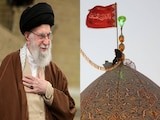The result of the West Bengal election will cause anguish to Modi but make Mohan Bhagwat happy. This may sound intriguing to many, but those who understand the ideology of the RSS will accept my submission. Modi and BJP are political entities. Their endgame is winning elections, forming governments. But for the RSS, capturing power is not the ultimate goal, it is to make India a Hindu society. Their target is to raise Hindu consciousness and make every Hindu realise that they are a proud Hindu. Mamata Banerjee reciting the Chandi Path and calling herself a Brahmin girl would have certainly gladdened Mohan Bhagwat's heart.
And let us not forget that she is not the only leader who had to prove her Hindu credentials during an election; before her, Arvind Kejriwal was heard reciting the Hanuman Chalisa and Rahul Gandhi was seen hopping temples and showing his sacred thread. The RSS had been upset all through that leaders after Independence had a problem projecting themselves as Hindu, whereas leaders of other religions were always upfront about their religious identities. If the wheel of history has taken a turn and today, leaders of other political parties are equally proud of their Hindu identity, don't feel shy about flaunting their Hindu-ness, in public and during elections, then why should the RSS not be happy? This is what the RSS has desired since its inception in 1925. This way it has accomplished its goal. Now it is the BJP's turn to worry about this paradigm shift.
The West Bengal election is a warning signal for Modi and the BJP. The BJP has undoubtedly come a long way in Bengal: from being a party of no relevance to gaining more than 80 seats in the Bengal assembly is an accomplishment. In 2016, BJP had only three assembly seats and only 10% votes. It had a spectacular showing in the 2019 parliamentary elections and won 18 seats with 40% vote share. Then, the assembly configuration had seemed more encouraging. The BJP had leads in 121 seats. It was for this reason that the BJP was very upbeat about Bengal, and why it put in all resources and effort in the state, hoping to cause a major upset in Indian politics.
There are three things which have gone against the BJP in the state.
1) The BJP from the beginning was handicapped by its own politics. For ideological reasons, it does not believe in wooing Muslim voters, it does not go to them asking for their votes. In Bengal, Muslims command 27% votes; some estimates put this at 30%. That means the BJP can win if it succeeds in polarising more than 50% of the rest of the population. The BJP tried its best to polarize Hindu voters. It tried its best to project Mamata Banerjee as a Muslim leader, accusing her of Muslim appeasement and suggesting that Hindus will not be safe if she becomes Chief Minister once again; she was called "Begum Mamata", to hint at her Muslim bias; voters were told that she wears a hijab. Mamata Banerjee knew she had to counter this narrative in a spectacular fashion. Knowing that Muslims were backing her firmly, she knew that she had to woo Hindus, and had to make them feel that she is not a Hindu hater as the BJP was suggesting. The Chandi Path recitation did the trick.
In this calculus, the BJP will always have a disadvantage. Other parties will always have a substantial chunk of minority votes in their pocket and the BJP has to start from zero. That means that if other parties can dispel the notion that they care only for Muslims and woo Hindu voters also, it can spell doom for the BJP and its politics of Hindutva. Because the politics of Hindutva by default gives an added advantage to anti-BJP parties. These parties will always have Hindu plus votes, that is, Muslims and a section of Hindu voters, whereas the BJP will have to be satisfied by only Hindu votes, and Hindus, being in the majority, will never be as consolidated as the minority community. In Bengal, this is what played out.
2) In this election, in somewhat strange logic, Mamata played the victim card despite being in the government and a two-term Chief Minister. She projected the BJP as an invading army who wanted to conquer Bengal by hook or by crook. And it worked. Mamata Banerjee had all the reasons to feel aggrieved and victimised by the Modi Government. Deployment of central forces to a very tiring 8 phases, there were many visible symbols of the centre interfering in state affairs. Last minute transfers of her close officers by the Election Commission also sent the same signal. She did not mince words in criticising the CRPF and the CISF, and blamed Home Minister Amit Shah for misusing central forces to defeat her. The killing of four persons by CISF in Sitalkuchi bolstered her argument.
Like in other states, the BJP freely used central investigating agencies to target Trinamool leaders. These agencies tried to implicate her own nephew and Number Two leader in the party, Abhishek Banerjee, on corruption charges. His relatives' houses were raided. Other leaders like Madan Mitra were also subjected to similar humiliation. The BJP had played the same trick on Sharad Pawar in Maharashtra and it had backfired. Mamata, being a very shrewd politician, used this to the hilt and garnered sympathy.
3) Mamata Banerjee also played the Bengali nationalism card very well. She constantly projected the BJP leaders as outsiders who know nothing about Bengal and its great tradition and culture. She and her party brilliantly communicated with the Bengali mindset that Bengal, which has always been a torch-bearer for the rest of the country, was in danger of being subverted by leaders from Delhi and Gujarat. It was very much like Modi playing the Gujarati card in the 2002 assembly elections. To her advantage, the BJP leaders proved themselves equally ignorant of Bengali tradition. "Jai Sri Ram" is a political slogan for the BJP which worked well in north India, but it has very little resonance in Bengal. Durga, not Ram, is the religious icon in bengal. Durga is part of the great Bengali tradition. BJP leaders like Dilip Ghosh said that Ram's ancestry is known but not Durga's; nothing could be more insulting to Bengal culture than this. When BJP leaders were harping on Ram, Mamata very cleverly said that even Ram worshiped Durga.
West Bengal has very clearly underlined the limits of Hindutva politics. Modi and Amit Shah can have an abundance of resources and state power but Hindutva, to succeed outside the Hindi heartland, needs to adapt to the local culture and assimilate with local traditions. Mamata Banerjee is undoubtedly a strong leader, but she is part of the Bengali culture and an attack on her became an attack on that culture, whose symbol she has become after the demise of the Jyoti Basu. The BJP, in order to succeed in Bengal, needed to invent a leader who personified Bengal; the abusive Dilip Ghosh is not made of that mettle, in fact, he is a liability. Bengal belongs to Raja Ram Mohan Rai, Rabindra Nath Tagore, Bankim Chandra Chatterjee, Vivekanand, Ramkrishna Paramhans, Satyajit Ray, Subhash Bose, Jyoti Basu, Somnath Chatterjee. It is easy to blame Bengal for violence, but difficult to understand the subtlety of its tradition. The BJP failed to do so and therefore it lost.
(Ashutosh is Author and Editor, satyahindi.com)
Disclaimer: The opinions expressed within this article are the personal opinions of the author. The facts and opinions appearing in the article do not reflect the views of NDTV and NDTV does not assume any responsibility or liability for the same.















